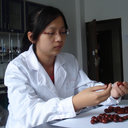Antidiarrheal effects of a thermostable protein fraction obtained from the larvae of Musca domestica.
Sleutelwoorden
Abstract
Our objective was to investigate whether a thermostable protein fraction (TPF) obtained from the larvae of Musca domestica, which contains cecropin family AMPs, is effective in treating senna leaf (Folium Sennae)-induced diarrhea in mice and its possible underlying mechanism. We did the experiments both in vitro and in vivo. Firstly, lipopolysaccharide (LPS) was used to induce inflammation in RAW 264.7 macrophages. The expression level of nitric oxide (NO) and tumor necrosis factor (TNF)-α was assessed using kits and immunofluorescence assay. A mice model of total diarrhea was established using a decoction of Folium Sennae. Levels of interleukin (IL)-6 and IL-1β in mice serum and of TNF-α in the supernatant of jejunal tissue homogenate were measured using commercially available ELISA kits. Hematoxylin-eosin staining was employed to evaluate pathological lesions, and immunohistochemistry was used for determining IL-1β, IL-6, and TNF-α expression levels. Results display that TPF markedly inhibited NO and TNF-α production in LPS-stimulated RAW 264.7 macrophages in vitro. Moreover, TPF significantly lowered the diarrhea index (DI) in diarrheic mice; when TPF was administered at a high dose (120 mg/kg) to mice, in comparison with mice in the model group, DI was markedly reduced. TPF could also decrease the expression levels of some pro-inflammatory factors, high dose TPF treated mice were with the reduction of (202.29 ± 18.58) pg/ml (tumor necrosis factor alpha, TNF-α), (53.69 ± 7.83) pg/ml (interleukin (IL)-1β, IL-1β), (48.44 ± 3.77) pg/ml (IL-6I, L-6) to the model separately. In comparison with berberine hydrochloride, which was used as the positive control in this study, TPF could confer better intestinal protection. To conclude, our results demonstrate that TPF has potent anti-inflammatory activities in vitro and antidiarrheal effects on mice with Folium Sennae-induced diarrhea.


